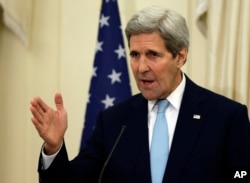Israeli Prime Minister Benjamin Netanyahu on Tuesday cautioned the United States against using a U.N. Security Council resolution to try to advance the stalled Israeli-Palestinian peace process.
Netanyahu's comments, made during an address to the pro-Israel lobbying group AIPAC, came weeks after reports suggested White House officials are considering a U.N. resolution that would lay out the basic guidelines for a two-state solution.
"A Security Council resolution to pressure Israel would further harden Palestinian positions, and thereby it could actually kill the chances of peace for many, many years," Netanyahu said via satellite at AIPAC's annual conference. "And that is why I hope the United States will maintain its longstanding position to reject such a U.N. resolution."
The Wall Street Journal reported earlier this month U.S. officials are considering reversing their opposition to using the Security Council as a way to resolve the Israeli-Palestinian conflict.
Both the U.S. and Israel have insisted direct talks are the only way to make peace. But some Palestinians, frustrated by years of failed talks, see the U.N. as the only way to achieve their goal for an independent state.
The U.N. resolution would call for both sides to make concessions long seen as fundamental to any two-state solution, according to the report.
Hopes fading for two-state solution
The plan has not been discussed publicly by U.S. officials. But Netanyahu's mention of it in his AIPAC speech suggests he is concerned President Barack Obama is seriously considering the move before he leaves office early next year.
U.S.-brokered talks between Israel and the Palestinian Authority broke down two years ago, each side blaming the other for failing to make enough concessions. White House officials have since said they do not expect a two-state solution to be reached during the rest of Obama's time in office.
In his speech Tuesday, Netanyahu said he believes the best way to achieve peace is "two states for two peoples, in which a demilitarized Palestinian state finally recognizes the Jewish state."
But U.S. officials, and an increasing number of observers, say that the chances for a two-state solution appear to be running out.
At a speech in December, U.S. Secretary of State John Kerry said that current trends, including violence and settlement activity, are "imperiling the viability of the two-state solution" and that the situation appears headed toward an "untenable one-state reality."
Palestinians are frustrated by the Israeli military occupation of areas they want as a future state. Next year will mark 50 years since 1967, when Israel's occupation began.
The situation has been exasperated by a wave of stabbing and car attacks, mostly carried out by young Palestinians, against Israeli soldiers and citizens. Since October, 29 Israelis and 190 Palestinians have been killed.
In his AIPAC speech, Netanyahu linked those attacks to the Tuesday bombings in Brussels, Belgium, where dozens were killed.
"This is one continuous assault on all of us," Netanyahu said. "In all these cases, the terrorists have no resolvable grievances. It's not as if we could offer them Brussels or Istanbul or California, or even the West Bank."







